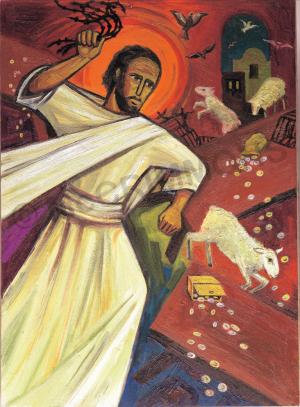
And they came to Jerusalem. And He entered the temple and began to cast out those who were buying and selling in the temple, and overturned the tables of the moneychangers and the seats of those who were selling doves; and He would not permit anyone to carry goods through the temple. And He began to teach and say to them, “Is it not written, ‘My house shall be called a house of prayer for all the nations?’ But you have made it a robber’s den.” And the chief priests and the scribes heard this, and began seeking how to destroy Him; for they were afraid of Him, for all the multitude was astonished at His teaching. Mark 11:15-18
People have different views of Jesus: Savior and Redeemer, Revolutionary, Radical Change Agent, Preacher of Peace and Tolerance, Self-Help Guru, Promiser of Prosperity, and on and on. These verses from Mark display a Jesus a lot of people like: Angry Jesus.
Twice Jesus cleansed the temple of money-changers and price gougers. The first time, recorded in John 2, He even wove together a small whip to physically attack them to drive them out. This “Angry Jesus” appeals to people, perhaps because of the strong emotion he displayed, or perhaps because we see Him in an underdog role taking on the establishment. Too often, though, Christians cite Jesus’ actions in cleansing the temple as justification for righteous anger. How often do we see Jesus like this compared to the number of times we see Him calm in the face of antagonism or adversity?
Dutiful Jews were required to make sacrifices at the temple at various times, particularly during Passover. Since many pilgrims came to Jerusalem for the holiday, it was more convenient for them to purchase sacrificial animals at the temple rather than bring them or try to find them elsewhere in Jerusalem and the surrounding villages. Of course, this led to higher prices being charged and the high priest would have certainly taken a cut from the profits. In addition, a temple tax had to be paid by the devout and this could only be paid in Tyrian shekels, which contained a higher percentage of silver than most other coinage of the time. So worshippers would have to exchange their Roman and other coins for the shekels, and always at an exorbitant rate, which also included the High Priest’s cut.
In cleansing the temple of these greedy enterprises Jesus cited two Old Testament verses:
Isaiah 56:7 – Even those I will bring to My holy mountain and make them joyful in My house of prayer. Their burnt offerings and their sacrifices will be acceptable on My altar; for My house will be called a house of prayer for all the peoples.
Jeremiah 7:11 – “Has this house, which is called by My name, become a den of robbers in your sight? Behold, I, even I, have seen it,” declares the Lord.
It was highly offensive to Jesus that the temple had been turned into a money-making enterprise that was taking advantage of those doing their best to follow the Law. The temple was God’s dwelling place on earth. Archaeologists have discovered a Greek inscription from the Court of the Gentiles (the outermost part of the temple) that dates from 20 BC that warns non-Jews not to proceed past that point on fear of death. Jews could go no further than the Court of the Men and the Court of the Women. Priests could enter the Court of the Priests/Temple Court to perform their ritual duties. Finally, the Holy of Holies where dwelt the presence of God was entered only once a year on the Day of Atonement by the High Priest. This was, indeed, holy ground.
Certainly Jesus’ actions were righteous. It is fascinating to me that He cleansed the temple just days before His death. Think about what happened at the temple on Good Friday – the veil separating the Temple Court from the Holy of Holies was torn in two, symbolizing that men could now have direct access to God because of the sacrifice of Jesus. The day before, Jesus foretold that the temple would be destroyed and would not be rebuilt until people again said, “Blessed is He who comes in the Name of the Lord.” (Matthew 23:37-39). Jesus was asserting the authority that was being proclaimed as He entered Jerusalem on Sunday. The temple was His house and He was reclaiming it days before His death would make it unnecessary.
What can we learn from Jesus’ actions? I think the lesson is much more important than “sometimes it’s okay to exercise righteous anger.” First, we must recognize Jesus’ lordship and authority – He is God and He was not just making a statement. He was exercising His authority in cleaning up His house. The second lesson for me is to consider what I need to clean up in my life. Too often, believers can do things that seem good or start good, but turn into self-serving actions. We can do things in the name of faith that become hypocritical in nature – think Pharisee. And sometimes God cleans our houses and it’s not pleasant.
Believers are now the temple of God on earth (1 Corinthians
3:16-17). How clean is your temple?
Discover more from This World Below
Subscribe to get the latest posts sent to your email.